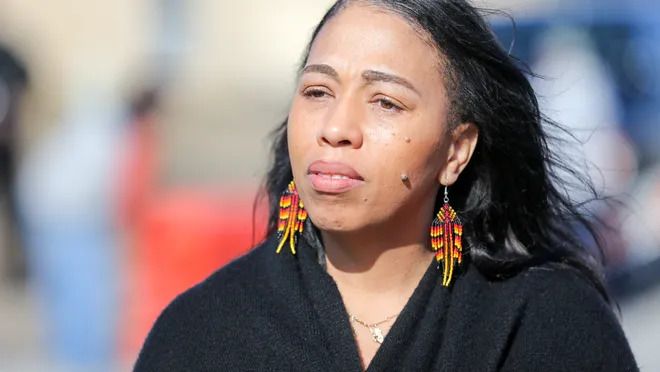
by Molly Young
OKMULGEE — Police started gathering outside the Muscogee Nation courthouse early Thursday, lining up their vehicles nearby and stopping drivers from parking too close.
Ron Graham arrived first. He has tried for nearly 40 years to become a citizen of the eastern Oklahoma tribal nation. He hoped the day’s court hearing would finally bring about change for him and thousands of other descendants of Black people once enslaved by, or part of, the Muscogee (Creek) Nation. "It would mean everything to me,” he said.
But first, Graham had questions for police outside the courthouse. Why all the security?
The undercurrent of tension that ran through the morning showed how complex the debate over Freedmen citizenship remains within the Muscogee Nation, even as the push gains attention across the U.S. Tribal officials say the nation's constitution sets out requirements for citizenship regardless of race. But Freedmen descendants say race is the dividing line.

The U.S. promised the Cherokee Nation a delegate in Congress.Lawmakers held historic hearing to consider next steps
A post-Civil War treaty ended slavery within the Muscogee Nation and says people of African descent living within the nation “shall have all the rights and privileges of Native citizens.” Many were enrolled until 1979, when tribal leaders changed the constitution. Citizens needed to trace their ancestry to a “by blood” census from the turn of the 20th century.
Federal officials who carried out the census created a separate list for people who appeared to have African American ancestry, attorney Damario Solomon-Simmons said. They were counted as Freedmen, regardless of whether they had any Native ancestors or were ever enslaved.
Solomon-Simmons, Graham and others have mounted decades of legal challenges to argue their treaty rights never went away when the constitution changed. By focusing on blood quantum, they believe tribal leaders are ignoring their shared culture and connections that trace back centuries.
“We have a long legacy of being a part of these nations,” said Rhonda Grayson, one of two plaintiffs in the current lawsuit. Solomon-Simmons is the lead attorney on the case.

“They've taken away our identity, our language, and just so much more culturally that we’ve missed out on because of this divorce, this separation from the tribe. And so we fight our fight because we have a responsibility to fight. Our ancestors fought for us. They walked the Trail of Tears so that we could be where we are today.”
Muscogee Nation Principal Chief David Hill declined through a spokesperson to say whether he supports citizenship for Freedmen descendants. In a written statement, he said he hopes the legal proceedings can help bring clarity.
“The proposition of enrolling any non-Creek person is a delicate issue for many of our people,” Hill said. “Emotions are often compounded by heated political rhetoric and hurtful, false accusations from those who favor doing so. I look forward to these proceedings providing some legal clarity that hopefully can create a more civil, fact-based discussion of this issue.”
Freedmen descendants pray to be recognized as Muscogee citizens
Grayson traces her ancestry to the Freedmen roll. When she applied for citizenship in 2019, the tribe’s citizenship board denied her application. She did not meet the requirements under the 1979 constitution. The constitutional change left her father, Emmit Grayson, feeling like he was pushed out of his own nation.
Rhonda Grayson joined a second Freedmen descendant whose application was denied, and together they sued in tribal court.
Supporters of Grayson and her co-plaintiff, Jeff Kennedy, chartered a bus to make the 45-minute drive south Thursday morning from Tulsa to the Muscogee Nation headquarters in Okmulgee. Road signs let visitors know they have arrived. They repeat the same slogan: “For our people. For our communities. For our future.”
About 30 people congregated inside the courthouse lobby and waited for the hearing to start. A few dozen others had to wait outside after officers deemed the lobby too full. Police guarded the courthouse doors.

Jason Salsman, press secretary for the Muscogee Nation, said the extra security ahead of Thursday's court hearing was standard procedure whenever large crowds are expected.
Inside, people joined hands and formed a prayer circle around the green and yellow seal of the Muscogee Nation inlaid in the lobby floor.
Emmit Grayson prayed over their long journey. He prayed Thursday would be the day for a new path toward citizenship. He prayed “we will be able to lift our heads and be proud of who we are.”
Cabinet member voices support for Freedmen citizenship
Congress is starting to pay attention not only to the Muscogee Nation, but to how each of the Five Tribes treats descendants of people they once enslaved.
A 2017 court decision prompted the Cherokee Nation to begin enrolling Freedmen descendants under its post-Civil War treaty, and the Seminole Nation also recognizes their citizenship rights.
Tribes are pursuing mobile gaming. Will that open the door to sports betting in Oklahoma?
Representatives of the Chickasaw, Choctaw and Muscogee nations testified at a Senate Indian Affairs hearing in July that each of their treaties is different and raises complex, unique questions about Freedmen citizenship.
The top lawmakers on the committee called for a report to investigate the government’s role in excluding Freedmen descendants. Federal officials signed off on the 1979 constitutional change within the Muscogee Nation.

In May 2021, Interior Secretary Deb Haaland approved a new Cherokee constitution that incorporates Freedmen descendants into the nation. She signaled that she hoped other tribes would follow suit.
“Today’s actions demonstrate that tribal self-governance is the best path forward to resolving internal tribal conflicts,” Haaland said about the Cherokee constitution. “We encourage other tribes to take similar steps to meet their moral and legal obligations to the Freedmen.”
Muscogee leaders are starting to address Freedmen citizenship through a “true healing process within the nation that’s fostered by information,” Ambassador Jonodev Chaudhuri told Senate lawmakers in July.
Freedmen descendants say they so far haven’t been involved in those conversations. They are pushing their case forward in court.
Oklahoma Gov. Kevin Stitt won a second term. Where does that leave Oklahoma's 39 tribes?
Lawsuit is latest legal challenge filed by Freedmen descendants
Supporters gathered for Thursday's hearing felt excited and optimistic as they lined up to enter the small courtroom. Some had been Muscogee citizens before they were disenrolled in 1979. Eloise Smith, 91, traveled from Las Vegas to observe the hearing because her Muscogee identity is so central to who she is.
“My grandfather talked about it all his life and he said, ‘Baby, don’t let it go’,” Smith said.
Members of the Muscogee citizenship board sat across the aisle, behind the tribe's attorneys. A handful of tribal leaders and employees also watched the hearing unfold.
Muscogee Nation District Court Judge Denette Mouser was considering a motion for summary judgment filed on behalf of Grayson and Kennedy. Their attorney, Solomon-Simmons, argued the law was so clearly on their side that there was no need for the case to go to trial. One of his ancestors, Cow Tom, helped negotiate the citizenship right of Freedmen descendants in the 1866 treaty.
Solomon-Simmons used a slideshow to make his case and narrate the history of Black people in the Muscogee Nation. He said Western expansion diminished the land promised to the tribal nation in present-day Oklahoma and divided Muscogee citizens in the Civil War — a point he made as his slide show displayed a Confederate flag.
Muscogee Nation Attorney General Geri Wisner immediately stood to object, saying the slide was inflammatory and oversimplified history. Many of the tribe's citizens fought for the Union, as well, she said.
She voiced so many objections to the slideshow presentation that the judge asked Solomon-Simmons for reassurance that he was going to connect the history to the current dispute over citizenship.

“I’m making a point here, that this is not something that just started with Jeff (Kennedy) and Rhonda Grayson,” he said.
When the time came to make the Muscogee Nation’s case, Wisner underscored the tribal constitution she was sworn to uphold. She also raised legal issues with the challenge itself, saying it went far beyond an enrollment appeal. She said the tribe's requests for key documents from the plaintiffs had gone unanswered.
The hearing came to a close after an hour and a half, without the swift judgment Freedmen descendants had hoped for. Mouser said she needed time to consider the issues raised. Without an immediate ruling, both sides will start preparing for trial in April.
Keith Webster traveled from California to attend the hearing with other relatives. He had been working to collect petition signatures to prompt the tribe to enroll Freedmen descendants like his family.
As he prepared to drive away from the courthouse, he said goodbye to other supporters. Next time he returns, he said, he will be standing in line for his tribal citizenship card. “We just want them to follow the law, real easy,” he said.
Emmit Grayson, who prayed for a decision that would allow him to reclaim his citizenship, still hopes the judge will side with Freedmen descendants.
“We had the dream,” he said, “and we’ve seen it, and we believe it.”






